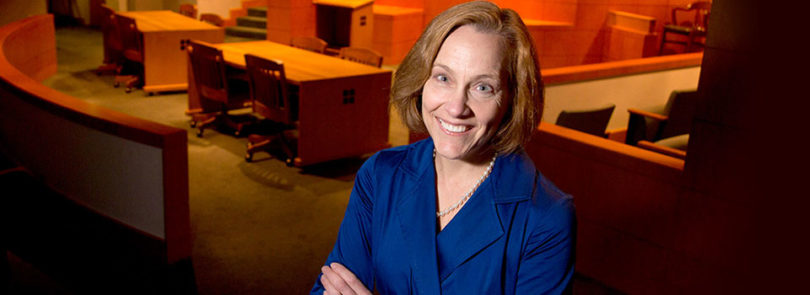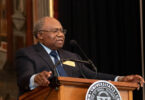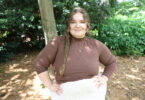Diane Marie Amann, who holds the Woodruff Chair in International Law at UGA, wants her students to understand the role that laws play in affecting public policy and current events.
Where did you earn degrees?
I earned my bachelor’s degree in journalism from the University of Illinois, Urbana-Champaign and my master’s degree in political science from the University of California, Los Angeles. I earned my J.D. from the Northwestern University School of Law in Chicago and hold an honorary doctorate (Dr.h.c) from Utrecht University in the Netherlands.
What are your current responsibilities at UGA?
I have held the Emily and Ernest Woodruff Chair in International Law at the University of Georgia School of Law since mid-2011. In addition, this academic year I accepted an invitation to serve as an affiliated faculty member of the UGA African Studies Institute.
When did you come to UGA and what brought you here?
My family and I moved here in mid-2011, from northern California; I had been on the law faculty at the University of California, Davis, since 1995. I came here to take up the Woodruff Chair, while my husband, Peter D. O’Neill, became an assistant professor of comparative literature in the university’s Franklin College. Our son, Tiernan O’Neill, enrolled in the public school system. As a sophomore at Clarke Central High School, he takes part in an array of activities, including the Odyssey news magazine, cross-country and the mock trial team.
What are your favorite courses and why?
Since arriving, I have taught public international law, international criminal law, and the laws of war. Next semester, I will teach constitutional law and a seminar on children and international law. Each is my “favorite” course, allowing me to work with students to improve understanding about the relation of law to critical current events.
What interests you about your field?
Things move so fast in our world. Events a continent away affect our economy, our environment and our well-being. It is fascinating to study how the makers of international law and policy try to regulate these developments.
What are some highlights of your career at UGA?
It was a particular honor to help the law school host, in October 2012, the annual Midyear Meeting of the century-old American Society of International Law. The law school is proud to be an Academic Partner of ASIL, the pre-eminent learned society in the field. Contributing to this meeting were my colleagues on the international law faculty and at the law school’s Dean Rusk Center for International Law and Policy—Harlan Cohen, Don Johnson, Laura Tate Kagel, Tim Meyer, Bo Rutledge and Larry Thompson. The meeting brought hundreds of officials, attorneys, law professors and law students to Athens. Among them were the top lawyers for the United Nations (Patricia O’Brien) and for the U.S. Department of State (Harold Hongju Koh), each of whom gave a superb keynote speech.
How does your research or scholarship inspire your teaching, and vice versa?
One of the joys of academia is the interrelation of research and teaching. The researching, writing and presenting of international law scholarship afford opportunities for deep thinking and for intellectual conversations that span the globe. This engagement helps make the classroom more vibrant. In turn, working with bright and inquisitive students through the literature of my discipline (case judgments, legislation, resolutions and academic articles) enriches my understanding of my field.
What do you hope students gain from their classroom experience with you?
I hope that my students gain awareness of the role that laws play—or could or should play—in affecting public policy and current events. With this awareness comes, I hope, skills in looking below the surface, asking questions about what is presented in the news media and thinking about how to use law as a tool for needed reform.
Community/civic involvement includes….
Perhaps unsurprisingly, my public service concentrates on legal matters. Most significant is my service as the Special Adviser to International Criminal Court Prosecutor Fatou Bensouda on children in and affected by armed conflict. Since my December 2012 appointment as the first holder of this position, I have visited the ICC headquarters at The Hague and have spoken and written on the subject of how war harms children and the role of international law in preventing and punishing such harms. In addition, last year I launched PACC, the Georgia Law Project on Armed Conflict and Children, in which selected law students assist me by conducting research on the topic.
Favorite book/movie (and why)?
The work of fiction that most moved me is Toni Morrison’s “Beloved.” The story of Sethe and the terrible choice she faces brings visceral reality to a paradigmatic crime against humanity, enslavement. A recent book I would recommend is “The Terror Courts” by Jess Bravin, a trained lawyer who is the legal reporter for The Wall Street Journal. With vivid prose, he situates the story of the Guantánamo military commissions within the framework of international and U.S. laws of war.







